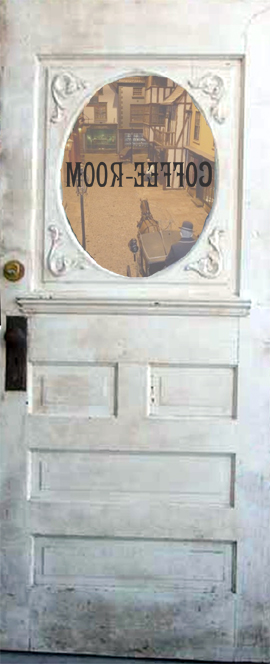An interesting word I came across in an essay by Tolkien:
Mooreeffoc, The oddness of everyday things when suddenly (and usually unintentionally) viewed from a new perspective.
Tolkien, while addressing the topic of fantasy-writing, uses this word in a discussion of what he seems to view as a "lower kind" of fantasy:
And there is (especially for the humble) Mooreeffoc, or Chestertonian Fantasy. Mooreeffoc is a fantastic word, but it could be seen written up in every town in this land. It is Coffee-room, viewed from the inside through a glass door, as it was seen by Dickens on a dark London day; and it was used by Chesterton to denote the queerness of things that have become trite, when they are seen suddenly from a new angle. That kind of "fantasy" most people would allow to be wholesome enough; and it can never lack for material. But it has, I think, only a limited power; for the reason that recovery of freshness of vision is its only virtue. The word Mooreeffoc may cause you suddenly to realize that England is an utterly alien land, lost either in some remote past age glimpsed by history, or in some strange dim future to be reached only by a time-machine; to see the amazing oddity and interest of its inhabitants and their customs and feeding-habits; but it cannot do more than that: act as a time-telescope focused on one spot. Creative fantasy, because it is mainly trying to do something else (make something new), may open your hoard and let all the locked things fly away like cage-birds. The gems all turn into flowers or flames, and you will be warned that all you had (or knew) was dangerous and potent, not really effectively chained, free and wild; no more yours than they were you. The "fantastic" elements in verse and prose of other kinds, even when only decorative or occasional, help in this release. But not so thoroughly as a fairy-story, a thing built on or about Fantasy, of which Fantasy is the core. Fantasy is made out of the Primary World, but a good craftsman loves his material, and has a knowledge and feeling for clay, stone and wood which only the art of making can give. [J.R.R. Tolkien, "On fairy-stories", Tree & Leaf, pp. 77-78]
Going back to Chesterton, we find the remark to which Tolkien refers ("elvish realism" would have attracted his attention, no doubt):
Herein is the whole secret of that eerie realism with which Dickens could always vitalize some dark or dull corner of London. There are details in the Dickens descriptions -- a window, or a railing, or the keyhole of a door -- which he endows with demoniac life. The things seem more actual than things really are. Indeed, that degree of realism does not exist in reality: it is the unbearable realism of a dream. And this kind of realism can only be gained by walking dreamily in a place; it cannot be gained by walking observantly...That wild word, "Moor Eeffoc," is the motto of all effective realism; it is the masterpiece of the good realistic principle - the principle that the most fantastic thing of all is often the precise fact. And that elvish kind of realism Dickens adopted everywhere. His world was alive with inanimate objects. [GK Chesterton, Charles Dickens CW15:65]
Finally, in Dickens' original:
The coffee shops to which I most resorted were, one in Maiden Lane; one in a court (non-existent now) close to Hungerford Market; and one in St Martin’s Lane, of which I only recollect that it stood near the church, and that in the door there was an oval glass plate with ‘COFFEE ROOM’ painted on it, addressed towards the street. If I ever find myself in a very different kind of coffee-room now, but where there is an inscription on glass, and read it backwards on the wrong side, MOOR EEFFOC (as I often used to do then in a dismal reverie), a shock goes through my blood. [Forster, Life of Dickens, I:ii, 'Hard Experiences in Boyhood' 1822-4]
Oddly enough, none of these texts mention the fact that "COFFEE-ROOM" seen backwards from the wrong side of the window wouldn't be "MOOR-EEFFOC", but rather "MOOЯ-ƎƎוּוּOƆ":
Be that as it may, Mooreeffoc is a rather useful word. I've experienced mooreeffoc from time to time with English words: suddenly an ordinary word in English like knight or gnomic will look foreign to me, as if it were Norwegian or German.
Experientially, mooreeffoc is disorientating, rather like the sensation of déjà vu. (which leads one to wonder: is mooreeffoc another "glitch in the Matrix"?)
Since I've only ever seen mooreeffoc in print, the question remains: how to pronounce it?
[ˈmɔːɹɛfɒk]/[ˈmɔːɹɛfɑːk] (UK/US)?
Some other online comments on mooreeffoc:



I'm going with 'moor-ee-fock'. Give that one a spin around the block.
ReplyDeleteThe CURE lexical set is alive and well in most of the U.S., where most people differentiate between moor and more, so the GenAm pronunciation would be /muɹɛfɑk/ ~ /mʊɹɛfɑk/. I drop length marks, since AmE lacks phonemic length.
ReplyDeleteThat said, I must also point out that GenAm is a notional accent: the way people spoke outside the South and the Northeastern cities half a century ago. Since then it has diversified into at least three accents, and Southern into two.
Oh Prof T, you old wizard!
ReplyDelete